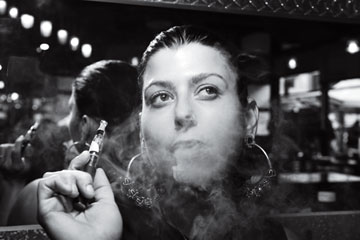
(3 of 7)
Today Johnson Creek says it has sold in 101 countries and is the largest provider of smoke juice after China. Berkey has traded his kitchen for 10 lab techs wearing white protective coveralls, who mix smoke juice in a lab in the basement of the company's 42,000-sq.-ft. headquarters in Hartland, Wis. The techs walk through two cleansing air curtains into a 65°F room with hospital-grade tile on the ceiling and air that circulates several times an hour. Inside, they mix batches of propylene glycol, nicotine, citric acid and flavoring in drums and jugs of varying sizes. The largest holds 1,000 L of the brew they make for Lorillard's brand, Blu, one of the two top-selling e-cigarettes on the market. The hallway outside smells like the flavor they are brewing that day--chocolate, tobacco or sinus-clearing menthol.
Demand for Johnson Creek's product is huge, and revenue jumped from $2.6 million in 2011 to $7.8 million in 2012. It is expected to reach $13.2 million by the end of the year. That isn't unique. Wells Fargo's Herzog estimates e-cigarettes' retail sales in the U.S. could exceed $10 billion by 2017 and operating margins could reach the mid-40s, higher than the roughly 40% margins for conventional cigarettes today. The potential market is huge. In the most recent report from the Federal Trade Commission in 2011, the number of traditional cigarettes sold to wholesalers and retailers in the U.S. was 273.6 billion.
Berkey says he is prepared for regulation. But like others, his business may suffer depending on what the FDA decides. If the FDA bans Internet sales, a strong possibility, that would affect 31% of his revenue: a key selling point for Johnson Creek is that if a customer orders by 9 a.m., the company will process and ship the order the same day. "We sell a product that for the most part contains nicotine," explains Johnson Creek's COO, Heidi Braun. "People want it, and they want it quickly."
Almost nothing, not even Heroin or cocaine, is more addictive than nicotine. While other drugs impair, nicotine enables. When you are sleepy, it wakes you; when you are anxious, it relaxes you; when you are hungry, it takes your hunger away. Heroin withdrawal causes unbearable flulike symptoms, but they eventually pass. People who've used both say it is harder to quit smoking. For quitting smokers, withdrawal is psychologically damaging; they feel anxious, depressed, irritable, bored and unable to focus. Perhaps that is why nicotine-replacement therapies, like the patch, the gum and the inhaler, effective in clinical trials, don't seem to work well in the real world. Even though half of smokers will die a slow and painful death from smoking, the 69% of smokers who say they want to quit know the odds are against them.
Electronic-cigarette companies are not allowed to promise that their product can help smokers quit, called a "cessation claim" in the industry. But though there is not enough scientific evidence to support the claim, a vocal group of evangelists say e-cigarettes saved their lives by helping them quit traditional cigarettes. When legislatures in Hawaii and Utah sought to regulate electronic cigarettes, they ignited protests. When the Italian government tried to levy a hefty tax on electronic cigarettes, protesters went on hunger strike.
